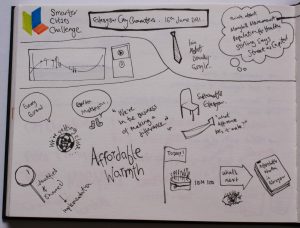Sustainable Glasgow: The Smarter Cities Challenge

Snook were very pleased to be invited into Glasgow City Council’s Development & Regeneration Services Department. We have been working closely with the team on the Maryhill Movement project; gathering qualitative data to sit alongside the quantitative information collected by the Council around the lives of its residents.
Snook were very pleased to be invited into Glasgow City Council’s Development & Regeneration Services Department. We have been working closely with the team on the Maryhill Movement project; gathering qualitative data to sit alongside the quantitative information collected by the Council around the lives of its residents.

As part of this relationship, we were invited along to the Sustainable Glasgow Smarter Cities Challenge event at the City Chambers. This was a presentation of the Councils involvement in an exciting venture with IBM (who were celebrating their 100th birthday that day).
“Glasgow has become the first UK city to win a grant from the IBM (NYSE: IBM) Smarter Cities Challenge initiative. The grant provides Glasgow with access to IBM’s top experts to analyse and recommend ways the city can become an even better place in which to live, work and play. The IBM Smarter Cities Challenge is a competitive grant program in which IBM is awarding a total of $50 million worth of technology and services to 100 municipalities worldwide over the next three years.
Teams of specially selected IBM experts will provide city leaders with analysis and recommendations to support successful growth, better delivery of city services, more citizen engagement, and improved efficiency.”
Glasgow is one of only 4 cities in Europe that have been selected for this partnership. I got the impression that the team who have been working on exploring the landscape, barriers and opportunities for more effective ‘Affordable Warmth’ in Glasgow really got to grips with the key voices that need to be listened to.
In a city that prides itself as being the cultural hub of this country, 95,000 householders fall into the bracket of ‘Fuel Poverty’. We heard accounts and watched a short video with Paige, a 10 year old girl from the Gorbals who has, for years, lived in a flat so full of damp that it has literally and figuratively begun to seep into her life outside of her home. Not only can she and her family not have any of their furniture against the walls, they cannot decorate or take pride in their own home. Paige cuts the mould spores out of her blinds when they get too dark and noticeable, she can’t sleep on her top bunk as the damp air creeps along through the night and makes it hard for her to breath. She gets teased as school because her clothes smell, and she can’t bring friends home to play.
Fuel Poverty is not just an issue for our aging population – it’s something that is affecting more people than we know. As a cultural capital, a European leader and a future Commonwealth Host this is simply not acceptable.
IBM have recently moved from their traditional Hardware background, to thinking about and creating software and applications that are angled towards social issues. Their work with the Council saw them harnessing the data that is being collected in relation to Fuel Poverty (or Affordable Warmth) and creating new ways of visualising, accessing and representing this data.
This data has, so far, been plugged into a new app. Created to share the information collected, I would like to see ways to break down the information included, making it more local and representative to a smaller area. The event got me thinking; how can this information feed back into the lives of the individuals who are, in a way populating it? How can it help to inform, and begin to shift their behaviours, perceptions and habits. The team from IBM were stressing the importance of being Energy Literate – I think this is something that refers not to Glasgow, not to your neighbourhood, but to your own 4 walls. If we can find a way for people to reflect on that, as an informed practice – then I think we might be on to something. Talking about these ideas afterward with a few of the team, I wanted to show them some visual examples of this type of feedback taking place.
One such example is the Brighton-based ‘Tidy Street’ which uses stencils to quickly feed back to local residents on their
energy consumption, in as real time as possible.
Moblie apps are great, there is no doubt that they are brilliant engagement tools, but they don’t work in areas where people typically don’t own smart phones, don’t seek out information online because they don’t know it is there to find, don’t know the difference between a search engine and browser. This is the audience we are working with, and ‘working with’ is critical in this venture being a success.
I would love to see ways in which this data can be useful for people. Making it easy for them to come across, engage with and relate to it is one route in. Paint it on the streets, paper the bus stops, post it back through their doors – put this intangible information back into the physical environments that it came from.
This is something that I would love to see happen next.
Thank you very much to Glasgow City Council and to IBM for inviting us in and sharing the work that has been done.